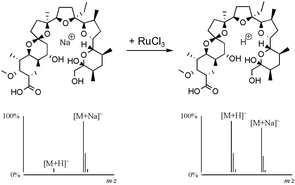The effect of ruthenium(iii) chloride on the formation of protonated parent ions in electrospray mass spectrometry
Abstract
We report the use of RuCl3 as an “

Maintenance work is planned for Wednesday 1st May 2024 from 9:00am to 11:00am (BST).
During this time, the performance of our website may be affected - searches may run slowly and some pages may be temporarily unavailable. If this happens, please try refreshing your web browser or try waiting two to three minutes before trying again.
We apologise for any inconvenience this might cause and thank you for your patience.
* Corresponding authors
a
University of Cambridge, Department of Chemistry, Lensfield Road, Cambridge, UK
E-mail:
pjg1002@cam.ac.uk
Fax: +44 (0) 1223 336362
b Institut Für Chemie – Organische Chemie, Freie Universität Berlin, Berlin, Germany
c Faculdade de Ciências Farmacêuticas de Ribeirão Preto, Universidade de São Paulo, Via do Café S/N, CEP 14.040-903, Ribeirão Preto-SP, Brazil
We report the use of RuCl3 as an “

 Please wait while we load your content...
Something went wrong. Try again?
Please wait while we load your content...
Something went wrong. Try again?
C. B. W. Stark, N. P. Lopes, T. Fonseca and P. J. Gates, Chem. Commun., 2003, 2732 DOI: 10.1039/B309913J
To request permission to reproduce material from this article, please go to the Copyright Clearance Center request page.
If you are an author contributing to an RSC publication, you do not need to request permission provided correct acknowledgement is given.
If you are the author of this article, you do not need to request permission to reproduce figures and diagrams provided correct acknowledgement is given. If you want to reproduce the whole article in a third-party publication (excluding your thesis/dissertation for which permission is not required) please go to the Copyright Clearance Center request page.
Read more about how to correctly acknowledge RSC content.
 Fetching data from CrossRef.
Fetching data from CrossRef.
This may take some time to load.
Loading related content
